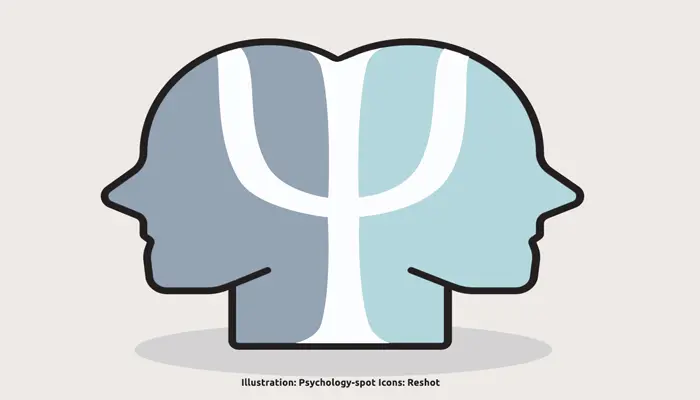
We all know some “unbearable people.” These are people who have a special ability to touch our most sensitive points, in such a way that they end up irritating, angering us and frustrating us practically every time we interact with them.
They can be arrogant or self-centered, excessively critical, manipulative or even hypersensitive, extremely rigid or downright pessimistic. However, the funny thing is that those traits that exasperate and get on our nerves, are not so annoying for others. In those cases the the mirror law comes into play.
What is the mirror law?
The mirror law suggests that any feelings we experience towards other people originate within ourselves. In practice, we should not seek the explanation for our anger or frustration outside, in others, but in ourselves through a deep exercise of introspection.
When we look at the others, it is as if we were looking at ourselves in a mirror. When we observe the others and analyze their attitudes and behaviors, we really discover ourselves in them, so that the profile that we sketch of the others actually contains many of our traits – or rather the shadows of our own that we reject. As Immanuel Kant said, “We see things, not as they are, but as we are.”
Science agrees with Kant. In fact, the mirror law has a scientific basis. An experiment conducted at the University of Warsaw revealed that “The more desirable a personality characteristic is in our self-assessment, the more central that characteristic is in the perception of others.” In other words, the more we value a quality in ourselves, the more important that quality is when it comes to valuing the others and relating to them. We see the others through our prism.
When we cast our shadows on others
Of course, the first reaction to the mirror law is usually rejection. We reject the possibility of being reflected in selfish or violent behavior. However, it is worth asking why those negative qualities of others resonate with particular intensity within us and generate such a visceral response.
That does not mean that we are selfish or violent people, but we may not feel that we are kind or peaceful enough. Or perhaps we have not made peace with that selfish and violent tendency that lives within each one of us.
No one of us is perfect. We all have flaws and areas of our personality that we can improve. However, we often ignore those deficits. We prefer to think that we are honest, kind, peaceful and empathetic people. In fact, we all have a positive bias in valuing ourselves.
Studies have shown that when we are faced with information that confirms the positive image we have of ourselves, we question its veracity, but a small piece of evidence is enough to believe it. Instead, when information goes against that positive self-image, we need a lot of strong evidence to believe it. That means we tend to strengthen our previous image and beliefs.
We find it difficult to recognize our shadows because we prefer to nurture an idealized image of ourselves. And we think that those positive qualities exclude the negative ones. But it’s not like that. We all have lights and shadows.
When we do not accept our shadows and see them reflected in others, we react disproportionately. The mirror law indicates that the imperfections of the others generate so much irritation because they activate areas of conflict within us, qualities that we have not accepted because they do not fit with the image we have of ourselves.
Although at first it is difficult to understand, accepting the mirror law can be a liberating experience that helps us to know ourselves better and makes interpersonal relationships more fluid.
How to apply the mirror law in our life?
Applying the mirror law is relatively straightforward. It is enough that when we notice a failure in others that generates a disproportionate emotional reaction, we use it as an opportunity for self-reflection.
For example, the mirror law tells us that if we think that someone is arrogant and bothers us, we should examine our ego for those traces of arrogance that we do not finish accepting. If we are extremely irritated by someone being selfish, we should value our concept of kindness, compassion, and empathy. If it bothers us that a person is very critical, we should rethink how we judge the others.
That does not mean that, if we are bothered by mental rigidity, for example, we are rigid people. It means that the rigidity is feeding a latent conflict. Maybe we see ourselves as people so flexible and open-minded that we reject that bit of rigidity that we all have. It means, therefore, that we have become unbalanced towards one extreme, moving away from the balance point, so that this quality is causing us problems in our interpersonal relationships.
The goal of the mirror law is that we learn to better know and accept the shadows that we normally reject. This way we can find an optimal operating point and develop a more realistic image of ourselves.
Accepting our shadows will help us improve our relationships with others, from a much more empathetic position, since we will understand that we can all make mistakes or have characteristics of which we are not particularly proud.
Of course, the mirror law does not work only for negative traits. When we feel a peculiar affinity for a person and connect on a deep level with him, we are also seeing reflected the traits that we like the most about ourselves. We must strive to look at people in a positive light. Give them a try. And be understanding. But when it gets tough, it’s an opportunity to look inward.
Sources:
Karpen, S. C. (2018) The Social Psychology of Biased Self-Assessment. Am J Pharm Educ; 82(5): 6299.
Lewicki, P. (1983) Self-image bias in person perception. Journal of Personality and Social Psychology; 45(2): 384–393.



